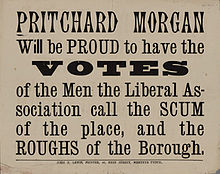


William Pritchard-Morgan (c. 1844 – 5 July 1924) was a Welsh solicitor, mine owner, and company promoter. He acquired the gold mine at Gwynfynydd in 1887, earning the name "Welsh gold king". He was also actively publicised as an investor in Sichuan, China.
He was born in Newport, Monmouthshire, the son of a clergyman. In early life he was a solicitor in Queensland, Australia, having been articled at Ipswich and Maryborough. He then speculated in mining shares.
He was a Liberal Member of Parliament (MP) for Merthyr Tydfil, from 1888 to 1900, when he was defeated, losing his seat to Keir Hardie. The constituency had two members, the other being the Liberal David Alfred Thomas, 1st Viscount Rhondda: there was antagonism between the two Liberals, however, and in 1900 Thomas backed Hardie. A major political issue between them was attitude to the Second Boer War, supported by Morgan who was on the Liberal imperialist wing of the party. He was in favour of Welsh disestablishment, making a lengthy parliamentary speech on a resolution in 1891.
References
- "Mining". Archived from the original on 7 October 2008. Retrieved 2 August 2010.
- 1888 newspaper report
- ^ New York Times article (PDF)
- 1887 newspaper
- Sir Robert Hart, James Duncan Campbell, The I. G. in Peking: letters of Robert Hart, Chinese Maritime Customs, 1868–1907, Volume 1 (1975), note p.1101.
- "GENUKI: The Merthyr Election of 1906". www.genuki.org.uk. Archived from the original on 18 March 2003.
- A Handbook on Welsh Church Defence (1894), Chapter 1.
External links
- Hansard 1803–2005: contributions in Parliament by William Pritchard Morgan
- New York Times article (PDF), 2 February 1899
| Parliament of the United Kingdom | ||
|---|---|---|
| Preceded byD. A. Thomas Henry Richard |
Member of Parliament for Merthyr Tydfil 1888–1900 With: D. A. Thomas |
Succeeded byD. A. Thomas Keir Hardie |
This article about a Liberal Member of the Parliament of the United Kingdom is a stub. You can help Misplaced Pages by expanding it. |
This article about a Member of the Parliament of the United Kingdom (since 1801), for a Welsh constituency is a stub. You can help Misplaced Pages by expanding it. |